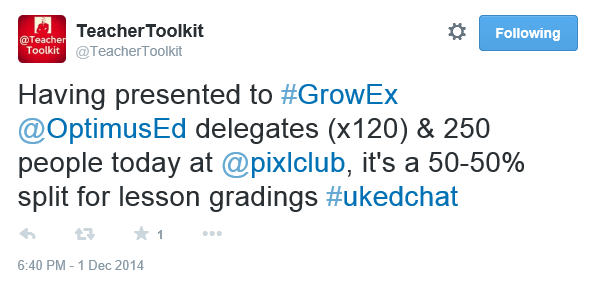We are right back at the a-h guilty list of graded lesson observation and Performance Review questions. Well almost. We pick up at c).
c) what might replace graded lesson observations and d) whether or not lesson observations should be a part of Performance Review (“graded” obviously removed), and e) whether or not lesson observations (graded or otherwise) should be a part of the Performance Review / Performance Related Pay and f) if not, what should be included and g) how will the removal of lesson grades impact on how the Quality of Teaching is qualified, (without grades/quantities/%) and h) If Ofsted is looking at “lessons across the curriculum, across the school” and making a judgement, and most importantly seeing “if the headteacher agrees with us [Ofsted]” how with this marriage of great minds actually work?
A hearty diet of education news sites, digests and edublogs, reflecting and complementing my own role, written by courageous, system changing Headteachers* and teachers** plus a range of official Twitter feeds, edutwitterati and prosaic feeds, would often leave me feeling Creosotian (if ever there was a state of being). Prioritising time to “think” felt unproductive and indolent. Meanwhile the Roulette ball was losing momentum and the drive to find a purposeful reflective and professional development process remained ever strong.
Every teacher needs to improve, not because they are not good enough, but because they can be even better. – Dylan Wiliam
We had some guidance along the way. “Why I want to try inspecting without grading teaching in each individual lesson,” – 04 June 2014,
New Horizons
Lesson observations, as part of Performance Reviews (PRs), as we all know, are about to communicating to the teacher how they can develop their practice, right? Hence, we have ‘Teaching and Learning’ yellow A4 lever arch ring binders proudly displayed on our shelves and a spreadsheet presenting various charts and tables in our user areas. Where the judgement on the quality of teaching becomes simply aggregate the grades awarded following lesson observations. Explicitly in hard-copy, what the Ofsted has said inspections should not be, and nor should they be for school self-assessment either.
Following Ofsted’s lead not to grade individual lessons, the adoption of non-graded lessons is slowly taking root. I accept it’s not Research – research, though Ross’s straw polls would suggest that only half of teachers will be observed without a graded judgement.
 With lesson observations inextricable tied to PRs, and PRs inextricable tied to Performance Related Pay (PRP), building the framework to facilitate PDS and non-graded lesson observations is so much more than merely removing the unreliable and crucifying grade. Who thought we could reimagine lesson observations without grades whilst introducing PRP simultaneously? Where performance was/is often quantifiably define? And if you are planning on being an early adopter, accept you are at the front of the queue for a slice of “I-told-you-so,” pie served up by Mr or Mrs Experience (see Patricia Metham left her mark). That said, we are, we have in fact and I for one believe hand-on-heart that it will be worthwhile. I feel assured by Paul Garvey (Lead Ofsted Inspector) comments, acknowledging that inspectors too, really are encouraged by the fact that can share with teachers “not to expect any kind of grade” from their visits to our classrooms. That the absence of the “grade conversation” meant that the void could be filled with a “much more interesting and I think, useful, conversation around the teaching and learning.” And so it should be in all observations feedback scenarios.
With lesson observations inextricable tied to PRs, and PRs inextricable tied to Performance Related Pay (PRP), building the framework to facilitate PDS and non-graded lesson observations is so much more than merely removing the unreliable and crucifying grade. Who thought we could reimagine lesson observations without grades whilst introducing PRP simultaneously? Where performance was/is often quantifiably define? And if you are planning on being an early adopter, accept you are at the front of the queue for a slice of “I-told-you-so,” pie served up by Mr or Mrs Experience (see Patricia Metham left her mark). That said, we are, we have in fact and I for one believe hand-on-heart that it will be worthwhile. I feel assured by Paul Garvey (Lead Ofsted Inspector) comments, acknowledging that inspectors too, really are encouraged by the fact that can share with teachers “not to expect any kind of grade” from their visits to our classrooms. That the absence of the “grade conversation” meant that the void could be filled with a “much more interesting and I think, useful, conversation around the teaching and learning.” And so it should be in all observations feedback scenarios.
The question then is, what evidence will now be used to evaluate teaching? My money is that Governors will soon be asking Principal’s for Teachers’ Standards analysis. They are already highlighted in the Ofsted Handbook (though Academies are no required to apply them?) heavily associated with performance management and the effectiveness of strategies for improving teaching.
Paul Blake (Garth) and I considered the suggestion that the analysis of the Teachers Standards could be presented as the percentage of staff that achieved/exceeded these standards, though that seemed awkward. How would the reviewer decide if a teacher exceeded the standard – ‘Adapt teaching to respond to the strengths and needs of all pupils?’ or ‘Fulfil wider professional responsibilities?’ So, given SchooliPs capacity to hold evidence assigned to an Objective, we asked the Development Team if the system could hold evidence assigned to a Teachers’ Standard aswell. Hence we went with;
- Met with broad* evidence
- Met with evidence
- Partially met with evidence
- Not met.
As for broad*. – having a ‘greater than usual measure across’ or ‘covering a large number and wide scope of subjects’ we are not sure. Comprehensive? Suggestions?
As a result of the removal of a quantified percentage, I expect many school leads for Quality of Teaching, Performance Review and Pay will be hastily revisiting the Teacher Standards, UPS standards, before sharing an expectation with staff to a) self-assessment, or b) peer / line manager assess, before moderating staff responses. Hence, we are hoping that SchooliP will beef up their already useful “Standards” reporting options.
With the degradation of graded lesson observations we have made a break for trees. Here at The Wellington Academy, we have signalled our intent to move aware from Lesson Observations, towards Learning Observations. To use observations for PDS and to focus on learning ahead of teaching.
Paul Garvey is an Education Consultant, Ofsted lead inspector and owner of QA South-West. He is also a blogger and tweeter @paulgarvey4.
Tom Sherrington*, A Thinking Head*, Michael Tidd – Primary, Shaun Allison – Class Teaching, Alex Quigley, CEM Blog – Centre for Evaluation and Monitoring, Chris Hildrew – Leading Learning, Daniel Stucke, David Didau: The Learning Spy, David Fawcett – My Learning Journey, Education_Researcher, Geoff Barton’s Pick ‘n’ Mix*, Improving Teaching, IOE London blog, Jack Marwood – Icing on the Cake, John Tomsett*, Keven Bartle*, Leadership Freak, M J Bromley’s Blog*, Mark Steed – An Independent Head*, Mary Myatt, Quality Schools (HMI Paul Garvey), Richard Spencer, Ros McMullen: Things I’ve learned and things I’m learning*, Scenes From The Battleground, Sky blue thinking, Thinking on Learning, Tim Dracup – Gifted Phoenix, Tom Bennett – The Behaviour Guru, Zoe Elder – Full On Learning, Clerk to Governors.
** teachers, more Senior than Middle leaders, more Secondary than Primary, more state than independent sector, education consultants, Ofsted, HMIs and most recently Governors (Clerk to Governors).


